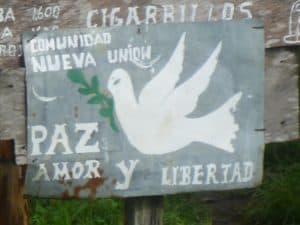ABColombia welcomes the ratification by the Colombian Congress of the revised Final Peace Agreement between the Government of Colombia and the Revolutionary Armed Forces of Colombia–People’s Army (FARC). But remains seriously concerned about the escalating levels of violence against human rights defenders with over 70 killed so far in 2016.
Following the initial signing of the Peace Accord on 26 September 2016 between the Government of Colombia and the FARC the Accord was put to a referendum on 2 October 2016. By a very narrow majority of less than 0.5 per cent the “No” vote rejecting the Peace Accord won.
However, there was a 62 per cent abstention rate; meaning that only 38 per cent of people eligible to vote, voted. It was noticeable that most regions voting “yes” for the Peace Accord lived in the rural regions where the worst of the conflict had taken place and where violence against the civilian population continues to be a major issue. The majority of the “No” vote was from the urban areas; the only exception being Bogota who voted for the Agreement.
The Colombian Government have started discussions with the political parties who campaigned for a “No” vote. The FARC immediately offered to extended the cease-fire in order to allow time for these disucssions. The Colombian government entered into discussions with various politicians, as well as, with those on the right of the Evangelical and Catholic Churches who had led a “No Campaign” linked to – what they termed – the “Gender Ideology” in the Peace Accord.On 3 December 2016, the Government and the FARC reached a final revised agreement having incorporated – according to President Juan Manuel Santos – 56 thematic changes.
The Governement and teh FARC-EP opted to go directly to Congress with the Peace Accord rather than to hold another ‘plebiscito’ (referendum). The revised Peace Accord was approved by 75 votes out of the 102 votes in the Senate and 130 of 166 in the House of Representatives. There was notably not a single vote against the Agreement. The Centro Democrático Party [1] withdrew from the Chamber in protest when the vote was taken.
Although a plebicite was not a legal requirement under Colombia’s Constitution the support for the agreemnet from Colombian citizens in order to strength its democratic validity had been the reasoning for doing so. Past peace agreements have not gone to a referendum, rather they have simply been ratificatified by Congress. Unfortunately, the “fast-track mechanism” approved by the Consituational Court to enable the different elements of the Peace Accord to be enacted into law had been linked by the Constitutional Court to a positive vote in the ‘plebiscito’. Currently the Constitutional Court has been asked to rule on whether the positive vote in Congress is of a sufficiently equivalency to a ‘plebiscito’ to allow the Governemnt to take a shortened route to approve the laws and Constitutional changes necessary for the implementation of the Peace Accord.
Despite a bi-lateral ceasefire with the FARC, the situation for Human Rights Defenders in Colombia is getting progressively worse. Colombia for many years has been recognised as one of the most dangerous in the world to be a Human Rights Defenders. However, at the moment it is plunging to even greater depths. During 2015, 63 human rights defenders were killed (HRDs) which meant that one in three defenders killed globally was Colombian. So far, this year (2016) over 70 Human Rights Defenders have been killed, 21 Arbitrary Detentions and 17 attempted assassinations.
Recommendations:
- Immediate implementation of point 3.4 of the Peace Agreement, which includes the creation of the National Commission on Security Guarantees and the Special Investigative Unit in the Attorney General’s Office.
- To take concrete measures, clarify and dismantle paramilitary structures that continue to operate in several regions of the country and are indicated, by the victims and their families, as the alleged perpetrators of many of these threats, attacks and murders.
- For the Ministry of the Interior, to present the results and conclusions of the High-Level Commission of Investigations created in March 2016, to address the murders of social leaders and human rights defenders.
- It is essential that they rule of law functions and that resources are prioritised in the Attorney General’s Office, to advance in the investigations and to bring to justice the material and intellectual authors of these crimes so they do not remain in impunity.
ABColombia calls on the UK Government, as a member of UN Security Council and prime mover of UN Resolution 2261, to ensure that the absence of a human rights verification component in this Resoultion is addressed; and to ensure that the human rights verification is undertaken by the United Nations Office of the High Commissioner for Human Rights in Colombia (OHCHR).
Other useful links:

